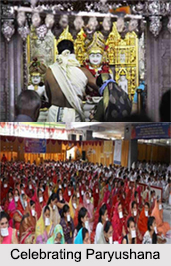 Celebrated on the fifth day of the shukla paksha phase of the Hindu calendar month of Bhadrapada, the festival of Paryushana lasts 8 days for the Swetambara and 10 days for the Digambara sect of Jains. Paryushana ends with the celebration of Samvatsari or Kshamavani, which means the day of forgiveness.
Celebrated on the fifth day of the shukla paksha phase of the Hindu calendar month of Bhadrapada, the festival of Paryushana lasts 8 days for the Swetambara and 10 days for the Digambara sect of Jains. Paryushana ends with the celebration of Samvatsari or Kshamavani, which means the day of forgiveness.
One of the main aspects of the festival is that there are no ascribed set of strict rules but the devotees are supposed to follow the five main vows or the Jain ethical code during Paryushana. These five vows are Ahimsa (non- violence), Satya (truth), Asteya (non- stealing), Brahmacharya (chastity) and Aparigraha (non- possession).
Etymology of Paryushana
The word Paryushana means “to abide and come togetherâ€. It is during this time that the Jain devotees take on the vows of study and fasting.
Significance of Paryushana
The true significance of the festival of Paryushana is to repent and seek forgiveness for any kind of sins committed. As the devotees observe the fast, they forget the bodily needs and focus more on enriching their mind and soul. They atone for their sins and take vows to not do any kind of wrong in the future. The festival provides an opportunity to reflect and introspect.
Observances of Paryushana
Fasting and forgiveness are two of the important aspects of Paryushana and it is known that the span of the fast can last from a day to 30 days or even more depending on the devotees. The different sections of Jains observe the festival of Paryushana in their own way. The Digambara Jains recite the 10 chapters of Tattvartha Sutra, the sacred Jain text during the 10 days of fasting.
The sravakas of the Digamabara Jainism do not consume food or boiled water more than once a day while observing fasts. And at the end of the festival, which is on the first day of the month of Ashwin Krishna, the sravakas request each other for forgiveness for all offences committed during the previous year. They also celebrate the festival of Anant Chaturdashi, which marks the day when Lord Vasupujya, the 12th tirthankara in Jainism, attained Moksha or nirvana.
On the other hand, the Swetambara Murtipujakas celebrate Paryushana for 8 days and recite the Kalpa Sutra, which also includes a recitation of the section on birth of Lord Mahavira on the fifth day. The Swetambara Sthanakavasis, recite the Antagada Sutra, which details the life of great men and women who attained moksha during the eras of Neminatha and Mahavira. The Swetambaras also fast and observe their fasts by simply surviving on boiled water which is consumed only between sunrise and sunset. They observe the end of the festival by seeking forgiveness on the Paryusha day.
In some Indian states like Rajasthan, Gujarat and Maharashtra, where there is a large population of the Jain community, slaughter houses are kept closed for 1 to 8 days during the Paryushana festival.
Dashlakshana Dharma during Paryushana
As per the sacred Jain text of Tattvartha Sutra, the Dashlakshana Dharma is the 10 righteous virtues followed by the Jain people. It lasts over a period of 10 days, each day being dedicated to one of the 10 Dharmas. The Das Dharmas are all prefixed by the word "Uttam", which means Supreme, to signify that they are practiced at the highest level by the Jain monks. The householder practises them to a lesser extent. Listed below are all the 10 righteous virtues observed during Paryushana:
•Uttam Kshama or Forgiveness
•Uttam Maardav or Modesty/ Humility
•Uttam Aarjav or Straightforwardness
•Uttam Soch or Contentment/ Purity
•Uttam Satya or Truth
•Uttam Sanyam or Self Restraint
•Uttam Tap or Penance
•Uttam Tyag or Renunciation
•Uttam Akinchanya or Non- Attachment
•Uttam Brahmacharya or Supreme Celibacy
Thus, Paryushana is an important Jain festival of self-introspection, self-enlightenment and self-achievement. It helps in purifying the soul and ultimately leads to the final goal of attaining nirvana or salvation.





